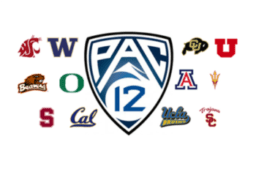Pac-12 rescue operation: Coronavirus loan program would bail out athletic departments if football is canceled
Jon Wilner (The Mercury News) — The Pac-12 is planning a mammoth loan program that would provide an escape hatch for cash-strapped athletic departments in the event the football season is canceled because of coronavirus, according to internal documents and conference sources.
Football accounts for the majority of each department’s revenue, generating in excess of $50 million dollars in ticket sales and media rights alone.
The loan program would be large enough to cover that loss for each school, if needed:
Each athletic department could decide whether it wanted to participate in the program.
If all 12 opted for the maximum amount, the total would be $996 million.
“The conference is trying to be nimble and give schools some options,’’ a source said.
However, multiple sources indicated that not every school would make use of the loan, and some would seek substantially less than the maximum allowable. If the Pac-12 plays a full football season, the plan could be pushed aside entirely.
The idea is popular with university presidents because the loan would allow schools to bridge the coronavirus crisis without having to implement massive budget cuts that could include widespread layoffs and possibly the elimination of Olympic sports teams, which do not generate a profit.
The plan also alleviates the pressure on the universities to rescue their own departments. Many campuses are facing enormous revenue shortfalls related to reductions in enrollment and housing.
“All loan capacity is being used for things besides athletics,’’ a source said. “They’re trying to get the core (academic) programs through for the next three years without firing people.
“If other people have debt capacity, they should use it.”
The impact of a shuttered football season would be monumental.
Oregon State relies on the sport for 80 percent of its annual revenue (approximately $80 million).
Colorado took in $20 million from ticket sales alone last season — on top of the approximately $30 million the Buffaloes receive from media rights.
At Utah, football generated $66 million in the 2019 fiscal year — two thirds of all revenues.
Meanwhile, several schools were carrying massive deficits before the pandemic struck.
Washington State’s accumulated debt was approaching $100 million.
UCLA was staring at a two-year shortfall of about $40 million.
Cal has often been in the red by more than $15 million.
With campuses fully leveraged, the presidents are turning the Pac-12 into a de facto debt facility.
Thanks to the media rights contracts with Fox and ESPN that are worth $1.2 billion over the next four years, the conference has the collateral necessary to secure a massive loan.
Even with a canceled season, the outstanding payments owed by the networks to the conference for the 2022-24 fiscal years — $917 million, according to the term sheet — would be enough to cover the loan, assuming every school did not take the maximum.
Multiple conference sources indicated the private schools, Stanford and USC, would be unlikely to participate in the program, and several of the public universities would opt for substantially less than the $83 million maximum.
Responsibility for the loan starting in 2024, when the current media rights deals expire, could shift to the universities, which at that point would be in better financial position to assume the debt.
Another option would be for schools to repay what they owe using the proceeds from the new media rights contracts, which are expected to provide a significant increase in annual revenue.
The idea to use the conference as the facilitator of the loan seemingly came from Cal chancellor Carol Christ.
In an email dated April 27, Oregon president Michael Schill writes to Washington president Ana Mari Cauce and Colorado chancellor Phil DiStefano:
“(Christ) asked about the Pac 12 borrowing to help us with this coming year’s potential unprecedented problem. No one opposed.”
Christ declined to comment for this article given that the loan program “is a complicated issue that is still under discussion,” according to a spokesperson.
A second email about the loan program involves a quartet of Pac-12 graduates who have been informally advising the conference on media strategy:
— Casey Wasserman (UCLA), chair of the Wasserman media group
— Jeff Smulyan (USC), the CEO of Emmis Communications
— Jim Packer (Colorado), president of worldwide TV at Lionsgate
— Larry Sonsini (Cal), founder of a global law firm and specialist in intellectual property
(All four declined to comment for this article.)
In an email dated May 11 that was included in the package of documents obtained by the Hotline, Smulyan writes to the other advisors:
“I learned from USC’s CFO that Larry Scott and the Raine group are proposing a significant loan program. Apparently, this will provide between $25 million to $83 million per school with a proposed 10-year term at a 3.75% rate.”
(USC’s CFO is James Staten. The university did not respond to a request for comment from Staten.)
The Raine Group is an investment bank that specializes in sports and media deals and was hired by Pac-12 commissioner Larry Scott for a related project in the winter of 2019.
The email from Smulyan to the advisors was forwarded by Packer, the Colorado alum, to DiStefano, the CU chancellor.
DiStefano, who was chair of the Pac-12 CEO Group at the time, then forwarded the note on May 12 to Cauce and Schill, who are members of the CEO executive committee.
DiStefano wrote: “I did not realize that the Raine group was still involved.”
Cauce answered: “Did not know.”
Schill, who succeeded DiStefano as chair of the conference’s CEO Group on July 1, responded:
“I didn’t either. I did know that Larry was going to investigate putting together a loan. I guess he went with Raine. I hope the terms reflect work and not a finder’s fee that is outside the norm.”
(Through a spokesperson, Schill declined to comment, and Scott was not available.)
Sources cautioned that the terms of the loan — 3.75 percent for 10 years, based on the email from Smulyan to the other advisors — have not been finalized.
The pursuit of an escape hatch for the athletic departments during the coronavirus crisis is, in many ways, the continuation of a process that began 18 months ago, when the Pac-12 first hired The Raine Group.
At the time, the athletic departments were concerned about an expanding, multi-year revenue gap by which the Big Ten and SEC, in particular, would distribute tens of millions more to their campuses than the Pac-12.
To close the gap, the Pac-12 explored long-term partnerships with investment and media companies that would serve twin purposes:
Provide an infusion of up-front cash to bolster the athletic departments and align the conference with a strategic partner to enhance the value of its media rights.
Scott hired The Raine Group to assist with the search for a partner. According to sources, the process lasted, in earnest, for about six months.
One of the obstacles: Potential partners wanted assurances that the conference would hold together — meaning that each school would be required to pledge its media rights to the collective for decades to come.
Without the revenue from those media rights, the value of the conference would diminish.
“They played around with a third party … but decided against any deal,’’ a source said. “They asked everyone to throw in a grant of rights for 25 or 30 years, and USC and UCLA were not going to do it.
“Who would invest in the Pac-12 for that length of time if USC and UCLA were not going to do it?”
That wasn’t the only impediment: Not every school was desperate for cash at the time.
Could the conference return to that strategy now?
“The CEOs don’t believe that equity plan can be revived right now — that they weren’t close enough to a deal,’’ a source said.
“The question is, how do you get the athletic programs through to new TV deal, and support them so they’re competitive at that time.”
The presidents continued to discuss ways to support athletics until the next media rights deal kicks in (the 2024-25 school year) — a strategy seemingly referenced by Schill in his April 27 email to DiStefano and Cauce:
“I would like to instruct Larry to start looking into the debt facility that we talked about earlier.”
The collapse in revenue caused by the pandemic — and the nightmarish prospects of a year without football — has changed the dynamic.
“Back 12 months ago, not many presidents were interested in a loan,’’ a source said.
“Now, I would image many are.”
__________
TrojanDailyBlog members — Always feel free to add information or topics to the TDB which don’t necessarily pertain to any particular moderator post or member comment.

